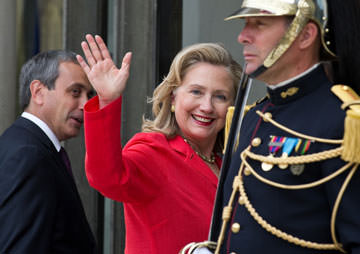Hillary’s Pre-Campaign Campaign
The curse of inevitability isn't likely to ruin Hillary Clinton's presidential ambitions, assuming she has them. Not this time. Frederic Legrand / Shutterstock.com
Frederic Legrand / Shutterstock.com
The curse of inevitability isn’t likely to ruin Hillary Clinton’s presidential ambitions, assuming she has them. Not this time.
Playing the role of president-in-waiting is the most precarious high-wire act in American politics. Clinton found that out in 2008, when a charismatic young senator from Illinois launched a wildly improbable campaign and somehow caught the wave of the zeitgeist and, well, you know the rest. Clinton made mistakes during the campaign that she seems determined not to repeat.
I’m assuming for the purposes of this essay that Clinton will run in 2016, which I do not think is a done deal. I take her at her word that she hasn’t made a final decision. And why should she run? The life of a mega-selling author — her memoir of her years as secretary of state, “Hard Choices,” is just out — looks a lot more fun than the life of a presidential candidate. No sense rushing prematurely into 18-hour workdays, endless bus rides and a diet of junk food.
Clinton can take the next six or eight months to survey the landscape and decide whether she still has that old fire in the belly. If she lacks the requisite fever, or indigestion, then she can take herself out of the conversation in time for the Democratic Party to assemble a credible field of candidates.
In the meantime, she is skillfully keeping others out of the race by dropping broad hints that she’s probably in. When you tell an audience to “join me in making some hard choices for America,” as she did in Denver last week, you’re doing more than just plugging a book. You’re trying out a line that might make its way into a stump speech.
“Hard Choices,” according to stories by news organizations that obtained copies in advance of publication, is far more substantive than the usual pre-campaign tome. Such books tend to be flag-waving manifestoes dripping with amber-waves-of-grain sentimentality. Clinton, by contrast, had years of recent foreign policy to recount, explain and defend.
She walks a fine line in establishing that she disagreed with President Obama on certain issues while supporting, without reservation, the basic thrust of his foreign policy. After all, she was the person in charge of implementing that policy. She would hardly be credible if she tried to renounce it.
So Clinton reveals that she perhaps wouldn’t have been so tough on Israeli Prime Minister Benjamin Netanyahu or so willing to proclaim that Egyptian strongman Hosni Mubarak had to go. She allows that she thought perhaps there was a way to intervene more robustly on the side of Syrian rebels trying to oust dictator Bashar al-Assad. She says Obama’s firm deadline for pulling U.S. troops out of Afghanistan was a bit “starker” than she would have preferred.
But she also recounts the many instances when she and Obama were on the same page — they both pushed for the daring raid that killed Osama bin Laden, for example. And she tells of a charming incident at an international summit in which Obama pulled her aside for what she thought would be an urgent consultation about one of the policy issues at hand. Instead, the president did what only a true friend does: He told her she had something in her teeth.
In the book, she also corrects what I think was clearly the biggest mistake she made in the 2008 campaign: She says forthrightly that her vote to authorize the war in Iraq was a mistake, and admits that she “should have stated my regret sooner and in the plainest, most direct language possible.” By “sooner” presumably she means “before the Obama campaign got traction.”
It’s a tough trick — establishing distance from Obama but not too much. She seems to be pulling it off. A recent Washington Post poll shows that while just 41 percent of Americans approve of Obama’s foreign policy, 59 percent approve of Clinton’s tenure as secretary of state. Two-thirds of respondents said they consider Clinton a “strong leader.”
And the poll showed that in hypothetical matchups against three possible Republican contenders — New Jersey Gov. Chris Christie, Sen. Rand Paul of Kentucky and former Florida Gov. Jeb Bush — Clinton wipes the floor with each of them.
Thus far, Clinton is expertly neutralizing the Inevitability Curse. Potential opponents should be on notice: She’s not going to beat herself.
Eugene Robinson’s e-mail address is eugenerobinson(at)washpost.com.
© 2014, Washington Post Writers Group
Your support matters…Independent journalism is under threat and overshadowed by heavily funded mainstream media.
You can help level the playing field. Become a member.
Your tax-deductible contribution keeps us digging beneath the headlines to give you thought-provoking, investigative reporting and analysis that unearths what's really happening- without compromise.
Give today to support our courageous, independent journalists.






You need to be a supporter to comment.
There are currently no responses to this article.
Be the first to respond.